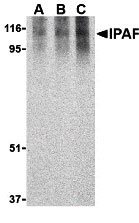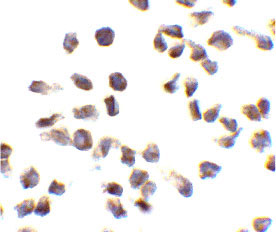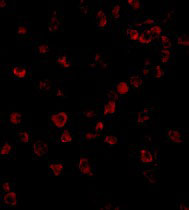Ipaf Antibody
- SPECIFICATION
- CITATIONS
- PROTOCOLS
- BACKGROUND

Application
| WB, IF, ICC, E |
|---|---|
| Primary Accession | Q9NPP4 |
| Other Accession | NP_067032, 40788015 |
| Reactivity | Human |
| Host | Rabbit |
| Clonality | Polyclonal |
| Isotype | IgG |
| Calculated MW | 110 kDa |
| Application Notes | Ipaf polyclonal antibody can be used for the detection of Ipaf by Western blot at 1 and 2 µg/mL. A 110 kDa band can be detected. Antibody can also be used for immunocytochemistry starting at 10 µg/mL. For immunofluorescence start at 10 µg/mL. |
| Gene ID | 58484 |
|---|---|
| Other Names | Ipaf Antibody: CLAN, IPAF, CLAN1, CLANA, CLANB, CLANC, CLAND, CARD12, CLR2.1, CLAN, UNQ6189/PRO20215, NLR family CARD domain-containing protein 4, CARD, LRR, and NACHT-containing protein, Clan protein, NLR family, CARD domain containing 4 |
| Target/Specificity | NLRC4; |
| Reconstitution & Storage | Ipaf antibody can be stored at 4℃ for three months and -20℃, stable for up to one year. As with all antibodies care should be taken to avoid repeated freeze thaw cycles. Antibodies should not be exposed to prolonged high temperatures. |
| Precautions | Ipaf Antibody is for research use only and not for use in diagnostic or therapeutic procedures. |
| Name | NLRC4 |
|---|---|
| Function | Key component of inflammasomes that indirectly senses specific proteins from pathogenic bacteria and fungi and responds by assembling an inflammasome complex that promotes caspase-1 activation, cytokine production and macrophage pyroptosis (PubMed:15107016). The NLRC4 inflammasome is activated as part of the innate immune response to a range of intracellular bacteria (By similarity). |
| Cellular Location | Cytoplasm. Cytoplasm, cytosol {ECO:0000250|UniProtKB:Q3UP24}. Inflammasome |
| Tissue Location | Isoform 2 is expressed ubiquitously, although highly expressed in lung and spleen. Isoform 1 is highly expressed in lung, followed by leukocytes especially monocytes, lymph node, colon, brain, prostate, placenta, spleen, bone marrow and fetal liver. Isoform 4 is only detected in brain |

Thousands of laboratories across the world have published research that depended on the performance of antibodies from Abcepta to advance their research. Check out links to articles that cite our products in major peer-reviewed journals, organized by research category.
info@abcepta.com, and receive a free "I Love Antibodies" mug.
Provided below are standard protocols that you may find useful for product applications.
Background
Ipaf Antibody: Apoptosis is related to many diseases and induced by a family of cell death receptors and their ligands. Cell death signals are transduced by death domain containing adaptor molecules and proteases including several members of the caspase family. Another family of proteins that functions as a critical regulator of apoptosis and NFκ signaling pathways is the CED-4/Apaf-1 (apoptosis protein activating factor-1) protein family. Ipaf (ICE protease activating factor) is a CED-4/Apaf-1 family member that activates caspase-1/ICE and can induce apoptosis in human cells in a caspase-1 dependent manner. Ipaf and caspase-1 are thought to interact with each other through the association of the Ipaf amino-terminal CARD (caspase recruitment domain) and amino-terminal CARD of caspase-1.
References
Li P, Nijhawan D, Budihardjo I, et al. Cytochrome c and dATP-dependent formation of Apaf-1/caspase-9 complex initiates an apoptotic protease cascade. Cell 1997; 91:479-89.
Poyet J-L, Srinivaula SM, Tnani M, et al. Identification of Ipaf, a human caspase-1-activating protein related to Apaf-1. J. Biol. Chem. 2001; 276:28309-13.
Geddes BJ, Wang L, Huang WJ, et al. Human CARD12 is a novel CED4/Apaf-1 family member that induces apoptosis. Biochem. Biophys. Res. Commun. 2001; 284:77-82.
If you have used an Abcepta product and would like to share how it has performed, please click on the "Submit Review" button and provide the requested information. Our staff will examine and post your review and contact you if needed.
If you have any additional inquiries please email technical services at tech@abcepta.com.













 Foundational characteristics of cancer include proliferation, angiogenesis, migration, evasion of apoptosis, and cellular immortality. Find key markers for these cellular processes and antibodies to detect them.
Foundational characteristics of cancer include proliferation, angiogenesis, migration, evasion of apoptosis, and cellular immortality. Find key markers for these cellular processes and antibodies to detect them. The SUMOplot™ Analysis Program predicts and scores sumoylation sites in your protein. SUMOylation is a post-translational modification involved in various cellular processes, such as nuclear-cytosolic transport, transcriptional regulation, apoptosis, protein stability, response to stress, and progression through the cell cycle.
The SUMOplot™ Analysis Program predicts and scores sumoylation sites in your protein. SUMOylation is a post-translational modification involved in various cellular processes, such as nuclear-cytosolic transport, transcriptional regulation, apoptosis, protein stability, response to stress, and progression through the cell cycle. The Autophagy Receptor Motif Plotter predicts and scores autophagy receptor binding sites in your protein. Identifying proteins connected to this pathway is critical to understanding the role of autophagy in physiological as well as pathological processes such as development, differentiation, neurodegenerative diseases, stress, infection, and cancer.
The Autophagy Receptor Motif Plotter predicts and scores autophagy receptor binding sites in your protein. Identifying proteins connected to this pathway is critical to understanding the role of autophagy in physiological as well as pathological processes such as development, differentiation, neurodegenerative diseases, stress, infection, and cancer.




